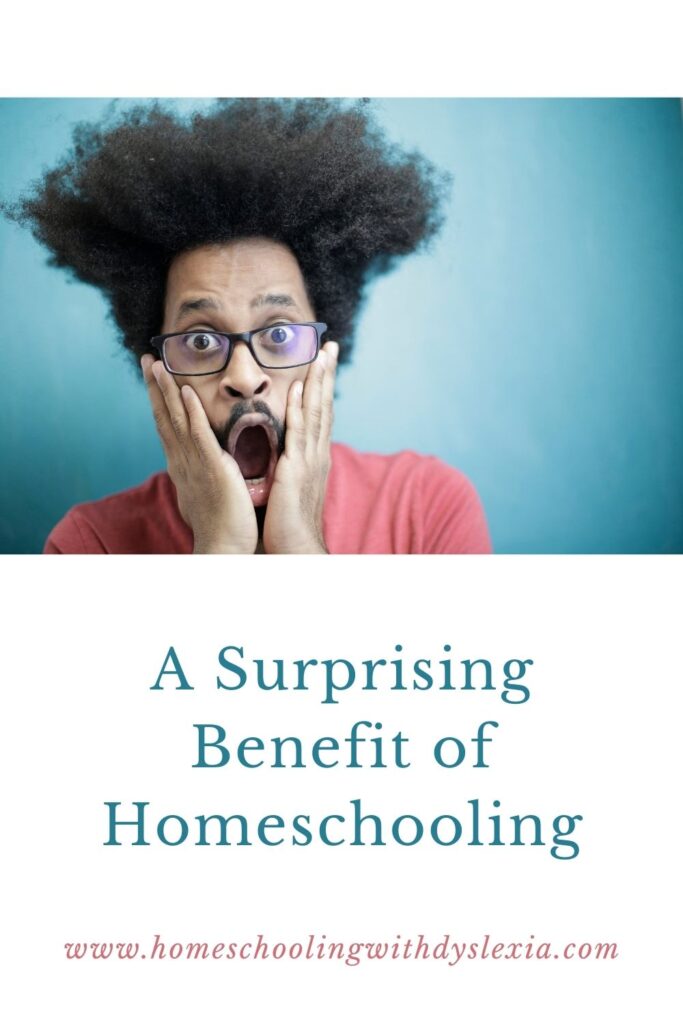As more and more of my kids graduate from homeschooling, I have observed a surprising benefit.

I was talking with my adult daughter this morning. She was lamenting the oddly annoying behaviors of some of the younger employees where she works. It was as if they had no common sense or critical thinking skills.
We chatted about how I had noticed a big difference in homeschooled kids versus kids who were in traditional schools all day very early on.
Homeschool Benefits
From having respect for authority, to making eye contact, to having well-rounded social skills, homeschooled kids were different.
They were better able to hold a conversation, showed kindness and interest towards younger kids and siblings, and were generally more engaged in what was going on around them.
I have written a lot about homeschooling outside the box of traditional education. In fact, I just wrote an entire book about it.
I would have been the first person to homeschool inside the box if my kids had allowed it! I was one of those kids who liked school; I felt satisfaction completing assignments and enjoyed being somewhat of a teacher’s pet.
As it turns out, with seven of my eight kids being dyslexic, the inside-the-box way of teaching and learning found in traditional schools doesn’t work.
This quote from my book, No More School: Meeting the Educational Needs of Kids With Dyslexia and Other Language-Based Learning Difficulties:
“For our children who struggle inside the box of traditional education, we have no other choice than to rethink education. Either we continue pounding our ‘square pegs’ into round holes until they break, or we look for a system of learning that accommodates square pegs.”
The Benefit of Outside-the-box Learning
For our family, school has looked far different from the school I knew growing up.
Their learning time was more like tutoring where I assessed their needs and taught them what they needed rather than placing them on the conveyor belt of education with a one-size-fits-all methodology.
After this tutoring time, there was largely free time to pursue interests.
This looked different through the years but it could look like checking out loads of books of interest from the library, watching documentaries together, taking field trips or joining clubs, travel, and finding meaningful work or mentorships.
I have written a lot about interest-led learning.
Using our kids’ interests to motivate them to learn makes learning more enjoyable.
For example, your child resists reading (because reading is hard for people with dyslexia and no one naturally likes to do things that are hard) but you bring home a stack of books about outer space, motorcycles, amphibians, China, or whatever your child is interested in at the moment and they will exert the effort to try to read those books.
Interest-led learning is also a powerful strategy to get more real learning in your homeschool.
Over the years our kids have been interested in outdoor life, coin collecting, cooking, raising and breeding animals, woodwork, medieval weapons, and on and on.
When our kids pursue these kinds of non-academic learning, they are actually doing English, Math, Science, History, etc while pursuing interests.
I detailed this in this post all about how to start interest-led learning and why it is so incredibly effective.
It’s true that our kids naturally do math, history, and science, as well as writing and doing research when they are pursuing their interests. It’s true that activities like researching, reading, budgeting, measuring, building, etc can fit into an academic category.
The Surprising Benefit of Homeschooling
But what is even more important about our kids having time to pursue what is naturally interesting to them is that they are problem-solving, thinking critically, and learning that they can learn anything of interest to them.
Even play, something I feared my kids had too much of, provides learning opportunities. From the physics of building forts to the art of painting and sculpting, to the math of probability while playing board games, play is valuable learning.
Powerful learning takes place when these skills of learning to think, read, calculate are done in context. Skills that equip them for a lifetime of meaningful, purposeful, engaged learning.






Spot on! I switched from a rigorous curriculum because others have done it to an interest led learning with my 8 year old last year . (Previous 15 years teaching first and third in public school) . The changes I saw in his learning and love of reading —wowza !! He loves science , loves math all because I of that reading switch to interest led book studies .
Can you recommend a typing program for kids with dyslexia? My kids are 12 and 10, and I wanted to start teaching them how to type.
Hi Jacquie,
Here is a program that is highly recommended:
https://www.readandspell.com/us/touch-typing-for-dyslexics
I see these kind behaviors and attitudes come back as I work with children online during our Zoom sessions – children who were once angry and frustrated and somewhat disrespectful were pulled out of public school to homeschool, and they become happy, interested, and secure children again.